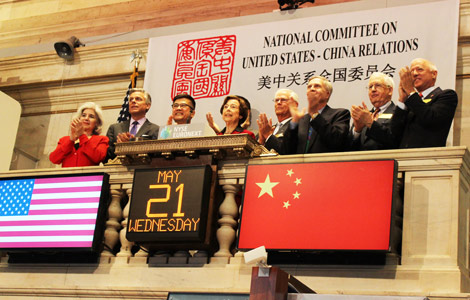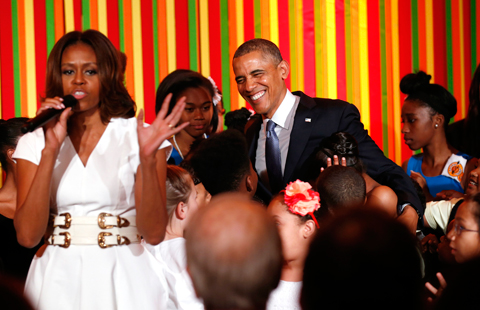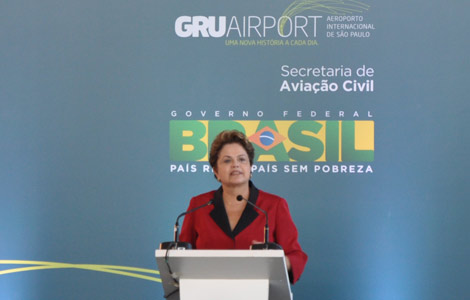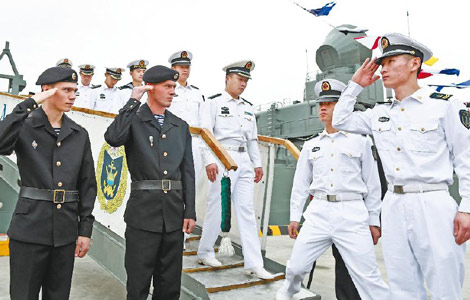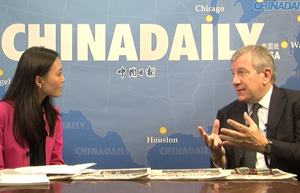Stop fueling maritime provocation, Beijing tells Washington
Updated: 2014-05-14 00:53
By ZHANG YUNBI (China Daily)
|
||||||||
Beijing described Washington's latest remarks on the South China Sea on Tuesday as "inspiring belligerency" after US Secretary of State John Kerry said China's use of an oil rig in its territorial waters was provocative.
Analysts said China left no doubt that it was clearly warning the United States to abandon "hypocrisy" and to stop publicly backing countries such as Vietnam and the Philippines on issues regarding China's sovereign territory.
Foreign Minister Wang Yi told Kerry in a telephone conversation that China wanted the US to "stop fueling provocations by relevant parties".
Beijing urged Washington to "stand firmly by its previous commitments, be cautious in words and actions" and observe the maritime situation around China in "an objective and fair manner", Wang said.
Kerry said the US had no intention of judging when it came to the sovereignty of a territorial issue and Washington hoped that all parties concerned handled issues properly and maintained the peace and stability of the region.
Teng Jianqun, an expert at the China Institute of International Studies, said the US had already fully engaged itself in a range of problems that had flared up in the Asia-Pacific region, at the expense of its relationship with China.
Sabotaging such a relationship may have unimaginable consequences for the regional situation and even the world, and "fatal faults" in (US President Barack) Obama's rebalancing strategy should not be ignored, Teng said.
Jia Duqiang, an expert in Southeast Asian studies at the Chinese Academy of Social Sciences, said Vietnam and the Philippines, under the shelter of the US, were provoking China to see if it would be intimidated by pledges made by Washington.
China says Vietnam sent 36 vessels, including warships, into waters off Zhongjian Island in China's Xisha Islands from May 3 to 7 to harass a Chinese oil rig's drilling operations. They deliberately rammed Chinese boats more than 170 times.
China also says that the Philippines charged nine Chinese fishermen on Monday after seizing them in waters off China's Banyue Reef. Beijing has demanded their immediate release.
Yuan Peng, a US studies expert and deputy president of the China Institutes of Contemporary International Relations, said the Obama administration appeared to be "drifting away from the gist of the century-long US diplomatic wisdom of maintaining a smart balance between two other nations."
Foreign Ministry spokeswoman Hua Chunying said on Tuesday that some countries had acted provocatively in the South China Sea in recent days, but China was not one of them.
If Washington truly hoped for peace in the Pacific Ocean, it should rethink how it should function and how it could ensure peace and stability in the region, Hua said.
Yuan added that the US had adopted a tougher stance in past months to demonstrate an unchanged policy focus in East Asia and to rally domestic support for the midterm elections.
Jia said the tensions caused by Vietnam and the Philippines had set bad examples and third parties may follow their lead to bully China if such problems were not resolved.
The Daily Tribune, a Philippine newspaper, attacked the country's President Benigno Aquino in an editorial on Monday, saying he "chose to take the US-prescribed path of agitating China to further substantiate the superpower's Asian pivot policy".
The newspaper added, "It is also noteworthy that the arrest of Chinese fishermen always happens at a crucial juncture like after the visit of key US officials, such as the recent overnight visit of US President Barack Obama."
Yuan predicted that after the US midterm elections later this year, the Obama administration may again tweak its East Asia policies to resume a balance in courting its treaty allies and China.
Most Viewed
Editor's Picks

|

|

|

|

|
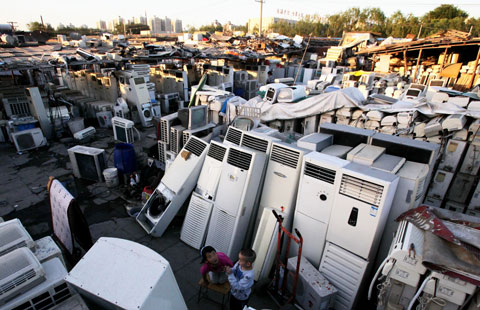
|
Today's Top News
US must 'get used to China's rise'
US cyber charge ridiculous
JD.com prices IPO above expectations
Cybertheft allegations by the US are 'absurd'
China outraged over US cybertheft charges
49 deals cement partnership
Indictments flack still festering
Group pushes for memorial
US Weekly

|

|
